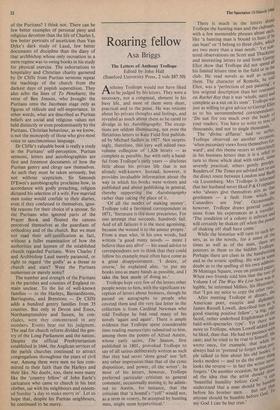Roaring fellow
Asa Briggs
The Letters of Anthony Trollope Edited by John Hall (Stanford University Press, 2 vols $87.50)
Anthony Trollope would not have liked to be judged by his letters. They were a necessary, not a congenial, element in his busy life, and most of them were short, practical and to the point. He was reticent about his private thoughts and feelings, and revealed as much about them as he cared to divulge in his Autobiography. The excep- tions are seldom illuminating, not even the flirtatious letters to Kate Field first publish- ed by Michael Sadleir in 1927. Not surpris- ingly, therefore, this very well edited two- volume collection of 1,826 letters — as complete as possible, but with only a hand- ful from Trollope's early years — discloses little about his private life that is not already well-known. Instead, however, it provides invaluable information about the way in which his books were written and published and about publishing in general, thereby supporting the Autobiography rather than taking the place of it.
'Of all the modes of making money', Trollope told a favoured correspondent in 1871, 'literature is the most precarious. For one attempt that succeeds, hundreds fail. And of all failures it is the most agonising, because the wound is to the amour propre.' From a man who, in his own words, had written 'a good many novels — more I believe than any alive' — his usual advice to correspondents not to think that they could follow his example must often have come as a great disappointment. 'I desire, of course,' he explained also, `to put my books into as many hands as possible, and I take the best mode of doing so.'
Trollope kept very few of the letters other people wrote to him, with the significant ex- ception of letters about business, though he passed on autographs to people who coveted them and the very last letter in the collection is from Cardinal Newman who told Trollope he had read many of his novels 'again and again'. There is ample evidence that Trollope spent considerable time reading manuscripts submitted to him, among them the poems of Alfred Austin, whose early satire, The Season, first published in 1801, provoked Trollope to say of all satires deliberately written as such that they had never 'done good' nor 'left any other impression than that of the cynic disposition, and power, of the writer'. In most of his letters, however, Trollope preferred particular criticism to general comment, occasionally muting it; he admit- ted to Austin, for instance, that the criticism that 'a hound's "yell" would not, as a term in venery, be accepted by hunting men, might seem hypercritical.'
about Trollope the hunting man and the clubman, with a few memorable phrases aboutcea hI like 'a hunting man is bound to hunt if he can hunt' or 'I belong to three clubs, which are two more than a man needs.' Yet scat- tered observations on Scott and ThackeraY and interesting letters to and from George Eliot show that Trollope did not spend a,11 his limited leisure time in the field or in the club. He read novels as well as writitM them. The character of Romola, he told Eliot, was a 'perfection of pen painting', a less original description than her comment, on Rachel Ray that it was 'whole, natty and complete as a nut on its stem'. Trollope was just as willing to give advice to George Eliot a, to otonohtisn ruenrreomo emmubcehredovecr the heads heads 01, your readers. You have to write to tens ot thousands, and not to single thousandsffer, The 'divine afflatus' had to su Trollope observed on another occasio fo n, `when pecuniary views force themselves r- ward'; and this theme recurs so relentlessly in his business letters that it is a relief t° turn to those which deal with travel, some severely practical, others gently OssiPY. Readers.of The Times are advised not to use the direct route between London and Basler via Luxemburg. Mrs Trollope is infc)rrriai nse° that her husband never liked P 0 cap who 'always give themselves airs as the gentlemen — a fault from which the Cunarders are free'. Occasionally' however, Trollope draws general conclu- sions from his experiences as a traveller; 'The condition of a colony is inferior Our will certainly be shaken off when the cove of shaking off shall have come.' While the historian will turn to such le,te ters, as to the novels, for a sense of tiL times as well as of the man, there ar`. pointers in them to the hidden Tr°11°Fe,, Perhaps there are clues in the handwritill! and in the erratic spelling. He was in some: doubt as to the spelling of his own addresr. 39 Montagu Square, even on printed PaPe,,,- When two friends told him that the text it Volume I of The Way We Live Now
legible, he informed Millais, his diustratvo: that 'I got my neice to copy the other twthe
After meeting Trollope at dinner, at, American poet, essayist and diPl°111 .3 James Russell Lowell, described hirn arsed. good roaring positive fellow', 'a big' f the faced, rather underbred Englishman o' was bald-with-spectacles type'. Yet there t, ,,t more to Trollope, whom Lowell added :41 he liked, than that. He had no patiencef‘ He cant; and he tried to be true to hinis,_e!,,, he wrote once, for example, that while always had to 'pretend to forget it pie talked to him about his old bootc.)_,, lf000rgkeststh:eoreovanothererse looks modest — and to do the other thing looks the idea that the artist shoulu s `beautiful humility before ca — on cfcaacsti othe nh e, hwer tie; ithi °von:: God'•ble before fore his brothert h a t a mina ne nsh. should be hg that but Ot d.T°
anyone should be humble before Go my God I can be but true.'






































 Previous page
Previous page